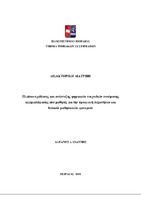Πλαίσιο σχεδίασης και ανάπτυξης ψηφιακών παιχνιδιών ενσώματης αλληλεπίδρασης από μαθητές για την προαγωγή δεξιοτήτων και θετικών μαθησιακών εμπειριών

Προβολή/
Λέξεις κλειδιά
Game design ; Assessment tools ; Motion-based touchless interaction ; Scratch ; Computational thinking ; Ενσώματη αλληλεπίδραση ; Σχεδίαση και ανάπτυξη ; Ψηφιακά παιχνίδια ; Αποτίμηση επίδοσης μαθητών ; Υπολογιστική σκέψη ; Embodied interactionΠερίληψη
Η παρούσα διδακτορική διατριβή ασχολείται με το ερευνητικό αντικείμενο της διερεύνησης του κατά πόσο μπορούν να προαχθούν πολλαπλές δεξιότητες και επιτευχθούν θετικές μαθησιακές εμπειρίες με την ενεργή συμμετοχή των μαθητών σε δράσεις σχεδίασης και ανάπτυξης ψηφιακών παιχνιδιών ενσώματης αλληλεπίδρασης. Σε μια κοινωνία που οι τεχνολογικές εξελίξεις είναι ραγδαίες και όλοι μας ερχόμαστε σε καθημερινή επαφή με σύνθετα προβλήματα (ill-structured problems) που απαιτούν την αξιοποίηση Η/Υ, η ανάγκη για καλλιέργεια συναφών πολλαπλών δεξιοτήτων είναι επιτακτική. Δεξιότητες όπως η επίλυση προβλήματος, η υπολογιστική σκέψη, ο κριτικός στοχασμός και η αναλυτική σκέψη, η δημιουργικότητα, και η συνεργατικότητα αναφέρονται συχνά στη βιβλιογραφία ως μερικές από τις πιο σημαντικές δεξιότητες του 21ου αιώνα. Σε αυτές τις δεξιότητες 21ου αιώνα κομβικό ρόλο παίζει και η υπολογιστική σκέψη (ΥΣ), η οποία θεωρείται πια μια θεμελιώδης μορφή νόησης για τον 21ο αιώνα και αποτελεί πεδίο έντονου ερευνητικού ενδιαφέροντος.
Τα τελευταία χρόνια έχουν εντατικοποιηθεί οι προσπάθειες εμπλοκής των μαθητών σε δράσεις δημιουργίας ψηφιακών παιχνιδιών. Ευρήματα από τις δράσεις αυτές είναι πολύ θετικά, καθώς φαίνεται πως βοηθούν τους μαθητές να ενισχύουν δεξιότητες, όπως την υπολογιστική σκέψη, συνεργατικότητα και την επίλυση προβλήματος, διασφαλίζοντας παράλληλα τις θετικές μαθησιακές εμπειρίες των μαθητών. Ωστόσο, προκύπτουν ανοικτά θέματα που πρέπει να ληφθούν υπόψη όταν προτείνεται η εφαρμογή της εκπαιδευτικής μεθόδου αυτής στην τάξη. Πιο συγκεκριμένα, πρέπει να δοθεί ιδιαίτερη έμφαση σε όλα τα στάδια/φάσεις του κύκλου ζωής ανάπτυξης ψηφιακού παιχνιδιού, καθώς πολλοί μαθητές φαίνεται να αντιμετωπίζουν δυσκολίες στην κατανόησή του. Επιπρόσθετα, αφού οι δράσεις δημιουργίας ψηφιακών παιχνιδιών από μαθητές καλλιεργούν πολλές δεξιότητες είναι ιδιαίτερα σημαντικό να γνωρίζουμε πώς να μετρήσουμε αυτές τις δεξιότητες. Για το λόγο αυτό προκύπτει ως πρόσθετη ανάγκη η αξιοποίηση αποτελεσματικών τεχνικών και εργαλείων πολυ-επίπεδης αποτίμησης της επίδοσης των μαθητών και η δημιουργία νέων. Έτσι, θα μπορέσει ο εκπαιδευτικός να γνωρίζει πολύ καλά το επίπεδο του μαθητή, τα δυνατά και τα αδύνατα σημεία του και να μπορέσει να έχει μια καλύτερη εικόνα για τις δεξιότητές του και όχι αν απλά δημιούργησε τελικά ο μαθητής ένα καλό ψηφιακό παιχνίδι ή όχι.
Παράλληλα, στη βιβλιογραφία αναδεικνύεται και ένα ακόμη στοιχείο. Υπάρχει η τάση να αξιοποιούνται νέα-μοντέρνα είδη παιχνιδιών με βάση τις νέες μορφές αλληλεπίδρασης και πιο συγκεκριμένα τη φυσική/ενσώματη αλληλεπίδραση, προκειμένου να κεντρίσουν το ενδιαφέρον των μαθητών και να αξιοποιήσουν ακόμη περισσότερο δεξιότητες όπως φαντασία, δημιουργικότητα. Ειδικότερα τα ψηφιακά παιχνίδια ενσώματης αλληλεπίδρασης (movement-based or embodied games) είναι νέο είδος παιχνιδιών. Ερευνητές έχουν ήδη επισημάνει πως ο συγκεκριμένος τύπος παιχνιδιών είναι πολύ πιο διαδραστικός, με αποτέλεσμα να ενισχύει ακόμη περισσότερο το κίνητρο και το ενδιαφέρον των μαθητών. Η ενεργή, επίσης, συμμετοχή των μαθητών σε δράσεις δημιουργίας τέτοιων παιχνιδιών, φαίνεται πως εμπεριέχει όλα εκείνα τα στοιχεία, με τα οποία μπορεί να ενισχύεται ακόμη περισσότερο η πρόκληση της δημιουργίας (creative challenge), καθώς οι μαθητές καλούνται, εκτός από το περιβάλλον του παιχνιδιού, να σχεδιάσουν και να υλοποιήσουν μηχανισμούς φυσικής/ενσώματης αλληλεπίδρασης του χρήστη στο παιχνίδι. Και λόγω αυτής ακριβώς της μεγαλύτερης πρόκλησης που προκύπτει, δίνεται η ευκαιρία στους μαθητές να καλλιεργήσουν ακόμη περισσότερο και άλλες δεξιότητες όπως τη φαντασία, τη δημιουργικότητα, καθώς και τη χωρική τους σκέψη. Από τη μελέτη της βιβλιογραφίας ωστόσο προκύπτει ότι οι δράσεις σχεδίασης και ανάπτυξης ψηφιακών παιχνιδιών ενσώματης αλληλεπίδρασης από μαθητές είναι σε εξαιρετικά αρχικό στάδιο.
Η παρούσα διδακτορική διατριβή προτείνει μια νέα εκπαιδευτική προσέγγιση «σχεδίασης και ανάπτυξης ψηφιακών παιχνιδιών ενσώματης αλληλεπίδρασης από μαθητές για την προαγωγή δεξιοτήτων και θετικών μαθησιακών εμπειριών». Η εν λόγω εκπαιδευτική προσέγγιση συνοδεύεται και από ένα πολύ δομημένο πλαίσιο αποτίμησης της επίδοσης των μαθητών, στο οποίο αξιοποιούνται συνδυαστικά τεχνικές και εργαλεία αξιολόγησης από τη βιβλιογραφία.
Η προτεινόμενη εκπαιδευτική προσέγγιση δοκιμάστηκε και αξιολογήθηκε με ιδιαίτερη επιτυχία από εκπαιδευτικούς και μαθητές σε αυθεντικά εκπαιδευτικά περιβάλλοντα μάθησης στη Δευτεροβάθμια Εκπαίδευση μέσω δύο παράλληλων πιλοτικών εφαρμογών και ισάριθμων συστηματικών αξιολογήσεών τους. Επιπρόσθετα, μέσω τεσσάρων (4) μελετών περίπτωσης σε προπτυχιακούς φοιτητές φάνηκε ότι το εν λόγω προτεινόμενο πλαίσιο μπορεί να βοηθήσει τον εκπαιδευτικό στη λεπτομερή αποτίμηση της επίδοσης των εκπαιδευόμενων με αυθεντικό τρόπο παρουσιάζοντας αναλυτικά στοιχεία για το επίπεδο κατάκτησης δεξιοτήτων.


